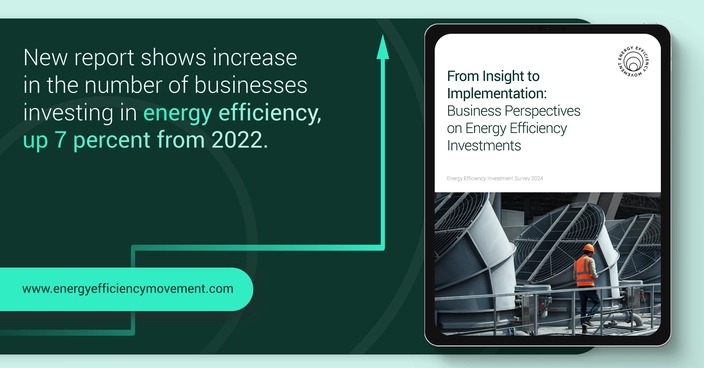New report: 93% of businesses plan to invest in energy efficiency, but barriers remain
Chủ nhật, 13/10/2024 - 10:19
According to the IEA (International Energy Agency), we must double the global rate of energy efficiency improvements until 2030 to reach net zero by 2050. In a world where energy and climate crises are intertwined, companies search for ways to keep up with sustainability regulations while maintaining profitability.
“At COP28, the world committed to working together to double energy efficiency progress this decade. Achieving the goal will need strong and early action from all sectors, including industry, so seeing an increase in businesses investing in energy efficiency is heartening. We commend this collective commitment to supporting global efforts toward energy efficiency – an essential step to a resilient and sustainable energy future,” said Brian Motherway, Head of Energy Efficiency and Inclusive Transitions Office, International Energy Agency (IEA), in a comment to the report.

61% of surveyed companies have already invested in energy efficiency measures, compared to 54% in 2022. 93% are planning to do so within the next three years.
1282 companies from 13 countries were surveyed, ranging from small enterprises with fewer than 100 employees to those with a $5 billion turnover and over 5,000 workers. It found that 93% of businesses plan to execute energy efficiency upgrades in the next three years, with 61% having already made investments. This is a significant increase from 54% in 2022.
Energy efficiency is crucial in the climate transition as it is, as the International Energy Agency puts it, the “first fuel” that allows us to do more with less energy. The most common measure implemented today is moving data to the cloud (72%), followed by energy efficiency audits as the second most common measure (69%). Efficient heating and cooling implementations are also popular, including improving the efficiency of cooling systems (64%), maintaining heat exchangers (60%), implementing heat reuse within own facilities (56%), and implementing heat reuse to sell to local energy companies (49%).
“An energy efficiency audit is a crucial foundation step towards achieving sustainable energy management. It is gratifying to see that 69% of businesses have committed to investing in or are already conducting such audits. They are instrumental in uncovering energy-saving opportunities, reducing costs, and guiding strategic investments that not only improve the bottom line but also contribute to a more sustainable future,” said Tarak Mehta, President of Motion Business Area, ABB.
The increasing energy costs of the 2020s are a concern to many companies, as the survey shows that 24% of businesses’ annual operating costs are attributable to energy usage, consistent with 23% in 2022. A majority (58%) of businesses refer to rising energy costs as at least a moderate threat to their profitability, an increase of 5 percentage points since 2022.
The majority of the increase comes from North and Latin America, areas where the power grids are still primarily fossil-based and therefore more reliant on potentially volatile international markets. As a result, more than half (52%) of the surveyed businesses consider cost savings the main reason to implement energy efficiency measures, tightly followed by corporate sustainability commitments (48%).

Rising energy costs have driven more companies to implement energy efficiency measures, but the cost of implementation is still seen as a barrier.
More effort must be put into the efficient implementation of these measures. Many technologies can significantly reduce energy use and thereby emissions – from efficient engines to heat recovery and heat exchangers – but they must be used properly. Research shows that the suboptimal maintenance of heat exchangers alone could account for 2.5% of global emissions, roughly equivalent to the airline industry.
Over half of the respondents (53%) say that the cost of implementation is the primary barrier to improving energy efficiency, even though energy efficiency is seen as reducing costs in the long run. Education is an important factor here, as areas where the awareness of energy efficiency technologies is high, such as China, Germany, and Sweden, rate this barrier as significantly less impactful compared to the 2022 results.
The survey also shows that businesses request more guidance from governments and third-party organizations on energy efficiency. Most companies would be persuaded to implement energy efficiency with a payback time of 5 years or less – here, financial incentives and increased awareness can do a lot to accelerate the adoption of energy efficiency, enabling significant emissions reductions.
“Energy efficiency is paramount in achieving the goals set forth by the Paris Agreement and the COP28 targets to double the global rate of energy efficiency improvements until 2030 to reach net zero,” said Thomas Møller, President of Energy Division, Alfa Laval. “The industry holds a pivotal position in this endeavor. According to the IEA, up to 50% of today’s potential for energy efficiency saving lies within the industrial sector, and by prioritizing increased energy efficiency, we can potentially drive over 40% of emissions reductions over the next two decades. This report underscores the urgent need for immediate action from the industry to commit and invest in energy-efficient solutions. This is crucial to accelerate the energy transition and for reaching net zero on time.”
According to Energyefficiencymovement. com
